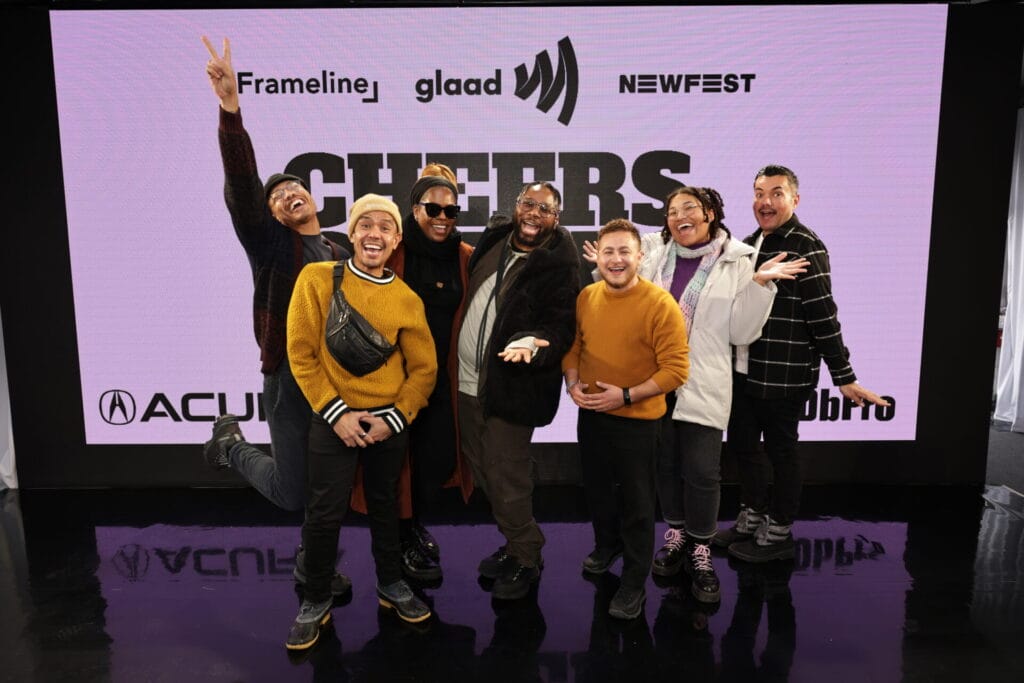Sundance Film Festival is, year after year, a celebration of independent film and independent filmmakers, and a number of initiatives implemented by the Sundance Institute (including programs like the Press Inclusion Initiative, Trans Possibilities Intensive, Ignite, and Women at Sundance) incubate the talent of filmmakers, journalists, and professionals that come from underrepresented and marginalized communities.
This year’s programming slate included a number of films, filmmakers, and official panels that spoke to the festival’s commitment to creating space for diverse voices and perspectives. As we navigate a political climate rife with the oppression of both historically disempowered communities and diversity, equity, and inclusion programs, it was refreshing and hopeful to see festival programming that continues to amplify the most marginalized voices that populate our everyday communities.
GLAAD’s 2022-2023 Where We Are on TV Report found that around 50 percent of all LGBTQ+ characters (304) on streaming were characters of color. While this is a positive sign, the report also noted that 140 of the LGBTQ+ characters counted were on shows that have been canceled, meaning they will not be returning to the screen. 79 of those canceled LGBTQ+ characters were people of color, key representation that will be lost in the current season.
While there is still much work to be done towards greater inclusivity, equity, and longevity when it comes to communities of color in the film and television industry, this year’s programming at Sundance is a testament to the fact that lack of on-screen diversity is not due to a lack of skilled storytellers, especially when it comes to Black queer stories and talent.
Black LGBTQ+ independent filmmakers and films lined the program across a variety of on-site panels and screenings, showcasing and sharing powerful and varied renditions of our lived experiences. Below, we’ve shared a glimpse of some of this year’s festival programming that featured Black queer storytelling and excellence:
PANELS & EVENTS:
On Friday, January 19th The Blackhouse Foundation, an organization that helps Black creative voices and executives gain a better foothold in the industry, hosted a panel at the Sundance Filmmaker Lodge titled “Black Storytellers to Know.”
The conversation was moderated by Valerie Complex (Deadline), a Black queer woman and military veteran whose life experiences influence her creativity and writing, and featured Jazmin Jones, a Black queer femme filmmaker and visual storyteller.
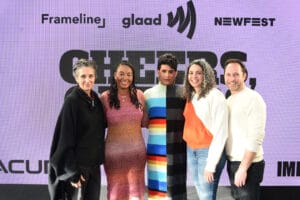
Also on Friday, January 19th, GLAAD, Frameline, and Newfest presented the “Queer Film is Activism” panel in partnership with Acura and co-hosted by IMDbPro, at the Acura House of Energy.
Featured on the panel was Natalie Jasmine Harris, the director of Grace, a short film that premiered at this year’s festival. Read more about Grace in the screenings section below.

On Saturday, January 20th the National Alliance on Mental Illness (NAMI) and Project Blackbird hosted conversations surrounding mental health in film titled “Using Narrative Film to Impact Mental Health in Underserved Communities.”
Following a screening of the short film “Blackbird,” two panels were hosted surrounding shedding shame, dismantling stigma, and addressing mental health both within film and within ourselves as professionals working in the entertainment industry. Panelists for the conversations included DeWayne Perkins (Writer/Actor, The Blackening) and Latavia Young (Producer, Grace), among many others. Ramfis Myrthil (Producer, Cicada), an unapologetic ally who champions POC and LGBTQ+ stories, also took part in the conversations.
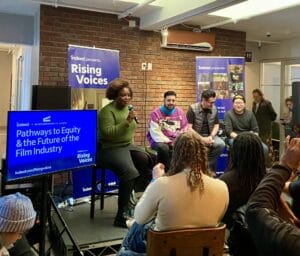
Also on Saturday, January 20th, Indeed and New Filmmakers LA presented “Rising Voices – Pathways to Equity and the Future of the Film Industry,” a panel discussion that featured Rishi Rajani, the CEO of Hillman Grad, Lena Waithe’s media and production company.
During the conversation, Rishi spoke on Hillman Grad’s commitment to equity initiatives. Waithe’s company has produced and supported numerous stories about and by LGBTQ+ people of color, and is a testament to the ways in which we can empower diverse storytelling and drive representation and equity from within our own communities.
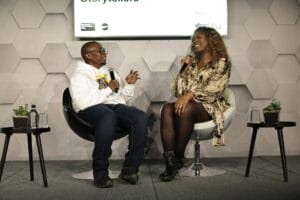
On Monday, January 22nd, GLAAD hosted two fireside chats at The Box at The Ray Theatre. One of the fireside chats featured director, producer, and writer Yance Ford (Power) in conversation with award-winning journalist and media personality Shar Jossell.
FILMS, FILMMAKERS, SCREENINGS, & TALENT:
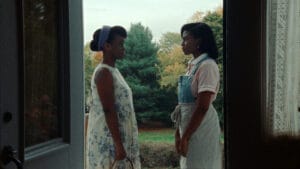
Grace, by Natalie Jasmine Harris. Sixteen-year-old Grace prepares for her baptism in the rural 1950s South. When she learns she must repent before the ritual, she begins to question the budding romantic feelings she has toward her best friend, Louise.
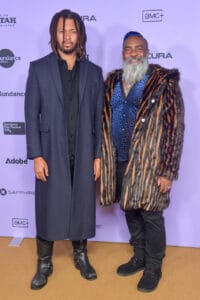
Merman, by Sterling Hampton. A 58-year-old Black Queer man speaks the truth about his life as an emergency nurse, a leather enthusiast, husband, and civil rights advocate.
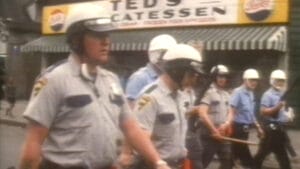
Power, by Yance Ford. Driven to maintain social order, policing in the United States has exploded in scope and scale over hundreds of years. Now, American policing embodies one word: power.
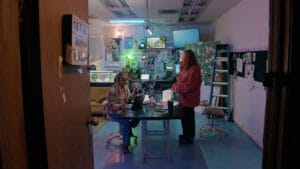
Seeking Mavis Beacon, by Jazmin Jones & collaborator/producer Olivia MacKayla Ross. Launched in the late ’80s, educational software Mavis Beacon Teaches Typing taught millions globally, but the program’s Haitian-born cover model vanished decades ago. Two DIY investigators search for the unsung cultural icon, while questioning notions of digital security, AI, and Black representation in the digital realm.
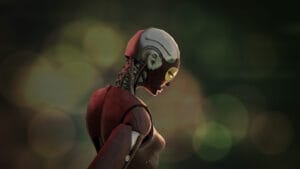
Being (the Digital Griot), by Rashaad Newsome. In this innovative participatory experience, Being, an artificial intelligence digital griot, asks the audience to engage in unifying and challenging discussions. It features a soundscape and movement informed by a dataset from Black communities, theorists, poets, and activists, including bell hooks, Paulo Freire, Dazié Grego-Sykes, and Cornel West.
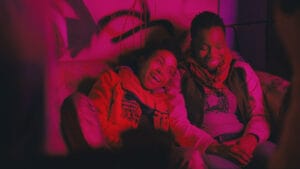
Pariah, by Dee Rees. When forced to choose between losing her best friend or destroying her family, a Brooklyn teenager juggles conflicting identities and endures heartbreak in a desperate search for sexual expression. Pariah first premiered at Sundance in 2011, where it won the Excellence in Cinematography Award.
The premiere of Pariah in 2011, years before marriage equality was legally institutionalized in the United States, was a seminal moment in history for Sundance and LGBTQ+ representation and cinema. Special screenings of Pariah were organized for the 2024 program as part of the film festival’s 40th Edition Celebration Screenings and Events.
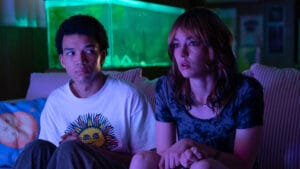
Actor Justice Smith appeared in multiple independent films that premiered at the 2024 festival, including I Saw the TV Glow and The American Society of Magical Negroes.
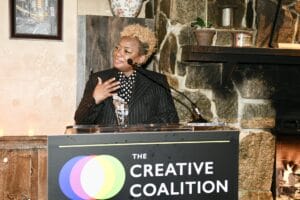
Aunjanue Ellis-Taylor appeared in Exhibiting Forgiveness, which premiered at the 2024 festival, and was honored at the Creative Coalition’s Spotlight Initiative Awards Gala Dinner.

